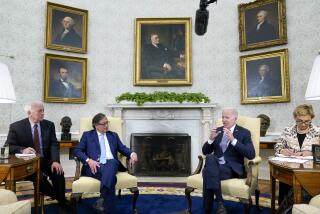Crowds Turn Out as Castro Tours Caracas on Visit to Sign Oil Pact
- Share via
CARACAS, Venezuela — Cuban President Fidel Castro and his effusive host, President Hugo Chavez, touring historic sites Friday, affirmed their own revolutionary paths even as lawmakers opposed to Chavez’s “social revolution” threatened to boycott a Castro speech to Congress.
The Cuban leader offered flowers at the tomb of South American liberator Simon Bolivar in Caracas’ National Pantheon, standing silently as Venezuela’s national hymn was played. Castro and Chavez then marveled at Bolivar’s jewel-encrusted sword before walking to a nearby home used by Cuban independence hero Jose Marti during a brief stay in Venezuela in 1881.
Hundreds of citizens waved Cuban and Venezuelan flags and shouted, “Welcome, Fidel!” The crush of onlookers kept security officers busy; police sealed storm sewers as a precaution, and soldiers brandished machine guns.
Castro is on a five-day visit to this oil-producing nation to sign a petroleum assistance pact. Both he and Chavez say they want to unite poorer nations in Latin America to counterbalance a “unipolar” world dominated by the United States and its economic allies.
In a brief speech before his appearance in Congress, Castro compared Venezuela’s attempts to preserve the capital’s colonial history to Cuba’s renovation of its historic Old Havana district--despite a lack of financing that he said stemmed from the 40-year-old U.S. economic embargo.
Castro condemned the U.S. government’s continuation of the embargo but thanked U.S. citizens for supporting the return of Elian Gonzalez, the 6-year-old Cuban boy at the center of an international custody dispute that ended earlier this year.
Opponents of Chavez, who led a failed coup attempt in 1992 before being elected president in 1998, called on Castro to improve his human rights record. Opposition legislators threatened to boycott a Castro speech to Congress later Friday.
“Fidel, guarantee freedom. Fidel, call elections. Fidel, give your people food,” said Roxana Ordonez, president of the opposition Social Christian party known as COPEI.
Castro arrived to full military honors Thursday and visited Vargas state, on Venezuela’s Caribbean coast, to meet some of the 450 Cuban doctors who have worked there since landslides in December killed an estimated 15,000 people.
Such “human capital,” he proclaimed, can more effectively promote development than industrialized nations’ financial aid with strings attached.
Chavez and his ministers say Cuba will be able to pay for part of the 106,000 barrels of oil a day it will receive from Venezuela by providing doctors, medical services, expertise on Venezuela’s sugar industry, sports coaches and advice on developing tourism.
Last week, Chavez signed similar oil pacts with 10 other Caribbean and Central American nations. In most cases, the countries can pay by barter and 15-year loans at 2% interest with a year’s grace period to pay for the oil.
Some Venezuelans have demanded that Venezuela use the money to create jobs and make good on pensions and promised pay raises.
Others applauded Cuba’s free help in devastated Vargas and joined him in denouncing the U.S. economic embargo of Cuba.
“I think it’s all positive because we are giving support to the Cuban people,” said Manuel Aloes, a 29-year-old telecommunications technician. “We are showing Cuba that it is not alone--that it has a brother country.”
More to Read
Sign up for Essential California
The most important California stories and recommendations in your inbox every morning.
You may occasionally receive promotional content from the Los Angeles Times.













